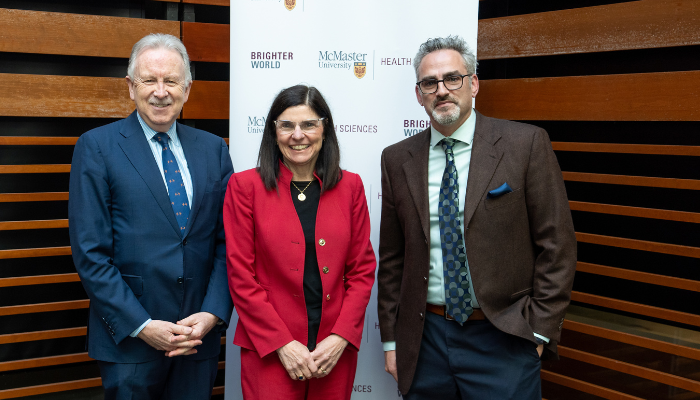McMaster researcher awarded federal funding to improve dementia prevention awareness

McMaster University researcher Anthony Levinson has been awarded nearly $400,000 in federal funding to support a project that aims to improve awareness of ways to reduce the risk of dementia.
The funding, part of the government’s Dementia Strategic Fund (DSF), was announced May 26 at McMaster by the Honourable Filomena Tassi, Minister of the Federal Economic Development Agency for Southern Ontario, on behalf of the Honourable Jean-Yves Duclos, Minister of Health.
Dementia is an umbrella term that describes a set of symptoms affecting brain function. It’s a chronic condition that gets more severe over time and is often characterized by a decline in memory, planning and language. In 2020, nearly 600,00 people in Canada were living with dementia and 955,900 people are projected to live with dementia in 2030. Levinson’s project will help educate Canadians about dementia prevention and the impact of healthy lifestyles and management of medical risk factors on the brain.
“Over the past several years, there’s been increasing evidence that people can substantially reduce their risk of getting dementia through a variety of different lifestyle factors and modifiable risk factors,” said Levinson, Professor, Psychiatry & Behavioural Neurosciences at McMaster University.
“Engaging in physical, social, and cognitive activities, maintaining a healthy diet and weight, managing high blood pressure, protecting your hearing, quitting smoking, and avoiding heavy drinking can substantially reduce your risk of developing dementia. The more risk factors you can address, the better; and it’s never too early or too late to engage in these healthy behaviours,” said Levinson, who holds the John R Evans Chair in Health Sciences Educational Research and Instructional Development.
Phase one of Levinson’s work, currently underway, is a randomized controlled trial of a web-based intervention consisting of a 30-minute e-learning lesson about dementia risk reduction and a series of educational emails over four weeks. Researchers are measuring knowledge, health behaviours, and intentions at baseline, four weeks, and two months after the end of the study.
Phase two, set to begin this summer, will make the web-based resource more widely available for the public through the McMaster Optimal Aging Portal. Bilingual e-learning tools will be promoted to help educate Canadians about the impact of healthy lifestyles and management of medical risk factors, such as hearing loss, traumatic brain injury, high blood pressure, diabetes, and drug side effects on brain health.
“Dementia affects too many Canadians and will increase as our population ages. Reducing the risk of dementia is a top priority for the Government of Canada. We are investing to improve Canadians’ knowledge about dementia and the importance of healthy behaviours. McMaster’s impressive research and knowledge mobilization efforts in the field of aging and dementia will go a long way toward this goal,” said The Honourable Filomena Tassi, Minister of the Federal Economic Agency for Southern Ontario.
Collaborations & Partnerships, FundingRelated News
News Listing

Department of Medicine ➚
Pain to progress: An impactful history of lupus research and care at McMaster
Collaborations & Partnerships, Education, Research
1 week ago

MIRA ➚
MIRA welcomes scholars from across the globe for landmark International Consensus Meeting on Wearables for Measuring Mobility in Aging Populations
Collaborations & Partnerships, Research
December 12, 2024

McMaster-affiliated non-profit gifts $300,000 to Global Nexus to support pandemic research
Collaborations & Partnerships, Research
November 15, 2024
